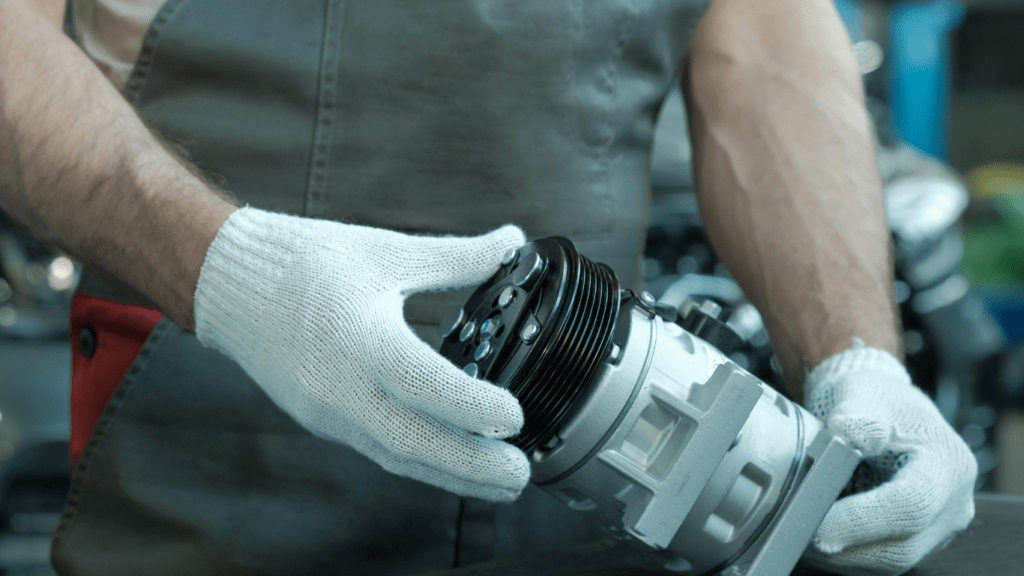Understanding Air Compressors for Auto Repairs
Having the right air compressor can make auto repairs and maintenance easier. It’s crucial to understand the different types and features to choose the best one.
Types of Air Compressors
- Single-Stage Compressors: Deliver high pressure in a single stroke, making them ideal for small tasks. They are compact, cost-effective, and easy to move.
- Two-Stage Compressors: Provide higher pressure, with two compression stages. Perfect for more demanding tasks, such as running pneumatic tools in a professional setting.
- Rotary Screw Compressors: Offer continuous airflow, suitable for long-duration jobs. These are typically larger and used in industrial environments.
- Portable Compressors: Lightweight and mobile, great for smaller garages or on-the-go repairs. They often have lower capacities but provide flexibility.
- PSI Rating: Ensures the compressor meets the pressure needed for your tools. Most automotive work requires 90+ PSI.
- CFM Rating: Measures airflow volume. Higher CFM, such as 6-7 CFM at 90 PSI, suits more intensive tasks.
- Tank Size: Larger tanks, like 20 gallons or more, support prolonged use without frequent recharges.
- Power Source: Decide between electric and gas-powered based on your garage setup. Electric is quieter and requires less maintenance, while gas is ideal for outdoor or heavy-duty use.
- Noise Level: Consider decibel ratings if working in residential areas or enclosed spaces. Models under 70 decibels are quieter and more user-friendly.
Understanding these types and features of air compressors will help you make well-informed decisions for your auto repair needs.
Best Air Compressors for Small Auto Repair Shops
Choosing the right air compressor for a small auto repair shop maximizes efficiency. Factors like portability and performance will guide this decision.
Portable vs. Stationary Compressors
Portable air compressors provide flexibility. They’re lighter, often mounted on wheels, and can be easily moved around the shop.
They’re ideal for tasks requiring movement like inflating tires or using pneumatic tools in different areas. However, they might not have the same capacity and power as stationary models.
Stationary air compressors offer higher power outputs. These units aren’t meant to be moved and typically have larger tanks, making them suitable for more demanding tasks like running impact wrenches or paint sprayers continuously.
If consistent high power is needed, then stationary compressors are the better option.
Top Picks for Small Shops
I’ve researched and identified top air compressors suitable for small auto repair shops, balancing power and portability.
- California Air Tools 8010: This portable model features a quiet operation with a sound level of only 60 decibels. It offers 2.20 CFM at 90 PSI, which is adequate for small tools and tire inflation tasks. Its oil-free pump requires minimal maintenance.
- DEWALT DXCM271: A sturdy stationary air compressor delivering 5.1 CFM at 90 PSI. It has a 27-gallon tank providing ample capacity for demanding tasks. Its high-flow regulator and couplers ensure maximum performance of air tools.
- Makita MAC2400: This portable compressor pairs a powerful 2.5 HP motor with a 4.2-gallon twin-stacked tank. It reaches an output of 4.2 CFM at 90 PSI, suitable for various pneumatic tools, and features a durable cast-iron pump for long-lasting use.
Choosing the right model depends on the specific needs and setup of the shop. Balancing mobility with power ensures optimal performance in various auto repair tasks.
Ideal Choices for Personal Garage Use
Selecting the right air compressor for your personal garage ensures your auto repairs go smoothly and efficiently.
Best for Home Mechanics
For home mechanics, I recommend the California Air Tools 8010. This model offers a great balance between power and portability with its 1 HP motor and 8-gallon tank.
Its ultra-quiet operation at 60 dB makes it ideal for residential areas. If you’re working on tire inflation or air ratchets, this air compressor handles 2.20 CFM at 90 PSI effortlessly. Additionally, its oil-free pump reduces maintenance hassles.
Budget-Friendly Options
If you’re looking for budget-friendly options, consider the Viair 88P. Priced under $100, it’s perfect for light-duty tasks such as inflating tires and powering pneumatic tools intermittently.
With a maximum pressure of 120 PSI and 1.47 CFM at 90 PSI, it provides decent performance for occasional use. Another economical choice is the Campbell Hausfeld DC080500.
This model costs around $200 and features an 8-gallon tank. Operating at 68 dB, it delivers 2.4 CFM at 90 PSI, suitable for various home garage tasks like running small impact wrenches and nailers.
High-Performance Air Compressors for Professional Settings

In professional auto repair shops, high-performance air compressors ensure productivity and efficiency. These models handle diverse tasks, from inflating tires to powering pneumatic tools.
Features Professionals Need
Professionals need air compressors with specific features to tackle demanding jobs such as:
- High PSI Rating: Provides the necessary power for heavy-duty tools.
- High CFM Rating: Ensures a constant airflow to run multiple tools simultaneously.
- Large Tank Size: Reduces the frequency of refills and maintains consistent pressure.
- Durable Build: Withstands rigorous daily use in a busy shop environment.
- Low Noise Level: Enhances a better working environment, especially for indoor settings.
Top Models for High Volume Auto Repairs
Quincy QT-54: Optimal for heavy-duty operations, featuring a 5 HP motor, 60-gallon tank, and a maximum PSI of 175. Its durability and efficient motor make it ideal for professional use.
Ingersoll Rand 2475N7.5: Known for its reliability in high-volume workshops, it boasts a 7.5 HP motor, 80-gallon ASME tank, and delivers 24 CFM at 175 PSI. Ensures continuous operation without overheating.
California Air Tools CAT-10020C: A quieter option with a 2 HP motor, 10-gallon tank, and operates at 70 dB. It provides 6.40 CFM at 40 PSI and 5.30 CFM at 90 PSI, balancing power and noise level efficiently.
Campbell Hausfeld CE7052: Features a 5 HP motor, 80-gallon tank, and delivers 16.6 CFM at 175 PSI. Suitable for extensive auto repair tasks requiring high power and capacity.
Choosing the right high-performance air compressor enhances operational efficiency, ensuring auto repair shops can meet their demands effectively.
Maintenance and Safety Tips
Maintaining air compressors properly and adhering to safety protocols is crucial for peak performance and longevity.
Regular Maintenance Checklist
- Inspect Air Filters: I replace or clean air filters regularly to ensure clean airflow. Dirty filters decrease efficiency.
- Check Oil Levels: Ensuring adequate oil levels for lubricated models prevents excessive wear. I change the oil every 500 hours of use or as specified by the manufacturer.
- Examine Belts: I inspect drive belts for signs of wear and replace them if frayed or loose to keep the compressor running smoothly.
- Drain the Tank: I drain the moisture from the tank daily to avoid rust and corrosion. Accumulated water compromises tank integrity.
- Tighten Fasteners: Vibrations loosen bolts and nuts over time. I regularly check and tighten them to prevent malfunctions.
- Monitor Pressure: I frequently observe the pressure relief valve and gauge to ensure accurate readings and safe operation.
- Wear Protective Gear: I always use safety glasses and ear protection to guard against flying debris and noise-induced hearing loss.
- Use in Ventilated Areas: Running air compressors in well-ventilated spaces prevents harmful fume accumulation. This is particularly critical for gas-powered units.
- Follow Manufacturer’s Instructions: Adhering to the instructions outlined in the user manual guarantees safe and correct usage. I never skip this step.
- Secure Hoses and Connections: Loose hoses can cause accidents. I ensure all connections are tight and secure before operation.
- Shutdown Procedures: I always turn off and disconnect the air compressor from the power source before performing any maintenance. This prevents accidental starts.
- Regular Safety Inspections: Conducting routine inspections for leaks, cracks, and other potential hazards ensures early detection and mitigation of risks.
Ensuring rigorous maintenance and adhering to safety protocols extend the life of air compressors and enhance operational safety in auto repair settings.

